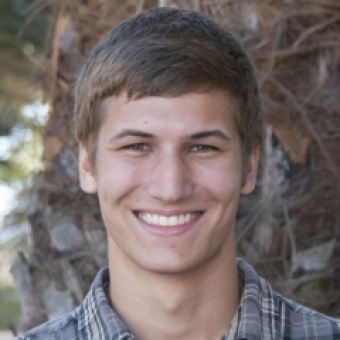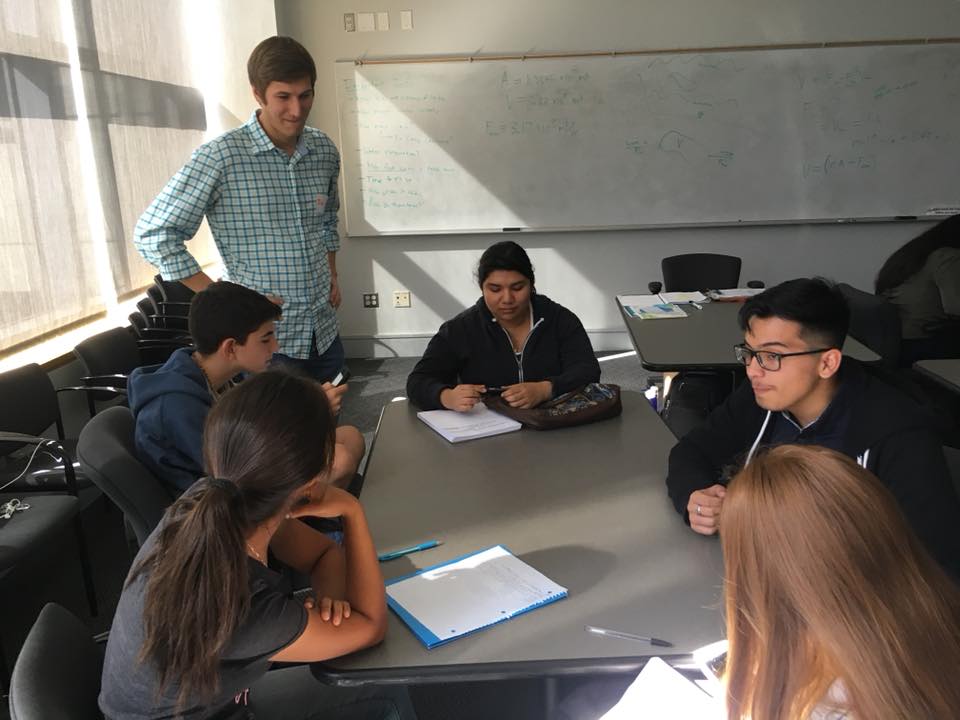
UC Santa Barbara graduate student Jacob Monroe of the Shell Research Group receives 2017 CoMSEF Graduate Student Award in Computational Molecular Science and Engineering at the AIChE Annual Meeting, held last week in Minneapolis, MN, from October 29 to November 2, 2017.
Monroe's creativity and resourcefulness has enabled him to carve out entirely new and impactful research directions in his PhD work.
“He has become an expert in, and really brought to bear, the full complement of simulation techniques, thermodynamic theory, statistical tools, and modern computing hardware and software,” said UC Santa Barbara Professor M. Scott Shell, Department Vice Chair.
Monroe has used molecular simulations to understand and predict how water mediates the interactions between solutes, particularly for realistic molecules with heterogeneous chemistries that move well beyond the simple, idealized models long-studied in the simulation field.
“My research focuses on creating models for interactions between peptides, or other solutes, that are established by and mediated through solvating water,” Monroe shared. “This includes hydrophobic interactions, which exhibit unique thermodynamic signatures depending on how the structure and dynamics of nearby water is modified.”
Most recently, he has shown how solute surfaces can be designed to manipulate solvation-shell water, through optimization algorithms coupled to molecular simulations, uncovering the important and unexpected role that nanoscale chemical patterning – beyond merely the average composition of different chemical groups – can play in determining solute behavior.
With his research he strives to provide a clearer picture of how multi-body correlations in water drive the thermodynamics of self-assembly processes.
“Fundamental ideas that come from this could help scientists and engineers create new classes of materials based on self-assembling peptides with properties that respond sensitively to things like temperature, pressure, or salt concentration,” Monroe shared.
One of the most interesting and challenging aspcets of his research is connecting all of the ideas related to a single topic, where "especially in the field of understanding water-mediated interactions there are many opinions and unique perspectives, often differing only in very subtle ways – I think it’s very important to take the time to understand these subtleties and identify how my own ideas fit in," said Monroe.
AIChE's Computational Molecular Science and Engineering Forum (CoMSEF) graduate student awards recognize excellence in research by graduate students. The intent of the awards is to reward significant contributions to research in computational molecular science and engineering by students. The award consists of a certificate and an honorarium. Monroe shared the honor with Prateek Mehta of Notre Dame University.
“This award came from a community of researchers for whom I have a great amount of respect,” said Monroe. “To be congratulated and complimented by these individuals, whose research I have studied and admired since I started my PhD, was very exciting.”
The Shell Research Group focuses on several problems in contemporary biophysics and condensed matter theory, using modern tools of statistical mechanics and molecular simulation, including folding and design principles in proteins, peptide structure, self-assembly, and aggregation, water and aqueous solutions, and multiscale modeling and advanced molecular simulation methods.
Monroe advises incoming students to show patience with themselves and their research.
“Always make time to read up on ideas that you are curious about, even if they aren’t directly related to your immediate research," he shared. “Good ideas don’t always develop quickly and many times come from exploring seemingly disconnected subjects.”

He also recommends a balanced life, and for himself achieves this through physical and creative outlets.
“When I'm not working, I enjoy running and practicing violin," Monroe said. “I’ve previously played with the UC Santa Barbara orchestra, and I am currently involved in a community sight-reading orchestra that’s been a lot of fun.”
Monroe's well-rounded lifestyle has also allowed him an outlet to give back to the community by developing a course for high school students, called the School for Scientific Thought Program, coordinated through the Center for Science and Engineering Partnerships at UC Santa Barbara.
The program involves five lectures of two hours each on Saturday mornings. Monroe's course was called, Modeling the Physical World: Gases, Liquids, Proteins and Everyday Life, and encouraged students to develop skills in creating and evaluating their own mathematical models, “drawing on examples from my own research involving molecular simulations,” said Monroe.
The AIChE Annual Meeting is the premier educational forum for chemical engineers interested in innovation and professional growth. Academic and industry experts cover a wide range of topics relevant to cutting-edge research, new technologies, and emerging growth areas in chemical engineering. The American Institute of Chemical Engineers is a professional organization for chemical engineers. AIChE was established in 1908 to distinguish chemical engineers as a profession independent of chemists and mechanical engineers. ChE

Photos: Jacob Monroe teaching a course for the School for Scientific Thought Program through the Center for Science and Engineering Partnerships at UCSB, and the Shell Group at Hendry's Beach in Santa Barbara.
Melissa Walker is the Communications & Seminar Coordinator/Faculty Assistant for the Department of Chemical Engineering.



